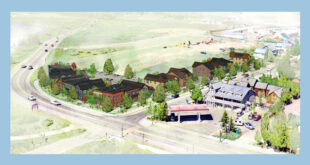Do something right and get a reward. It’s all about yin and yang
By Mark Reaman
Crested Butte is no doubt a bike town. But bikers are obligated to follow the rules of the road and not everyone does. This can cause issues for motorists and other bikers, so the local marshal’s department is reaching out to cyclists with a new program that rewards cyclists who are seen following the rules.
The “Be Safe, Be Seen” program was started this spring and comes down to local law enforcement officers rewarding those people following the law.
Crested Butte chief marshal Mike Reily says Crested Butte is by-and-large a pedestrian-friendly, bike-friendly town with limited sidewalks and a healthy mix of transportation options sharing a typical 25-foot wide roadway.
“Fifteen-mile-an-hour roads and friendly travelers make getting around on your favorite townie bike a simple affair. This bike-friendly atmosphere leads some riders to neglect the type of activity that would get them crushed in another town,” Reily says. “Running stop signs, failing to use a headlight at night, riding against traffic, riding double or triple abreast are self-righting problems in the big city: those riders get hit by cars.
Having been to our fair share of bike versus car crashes, we have an interest in keeping everyone safe and in promoting safe cycling,” Reily continued.
Reily says the go-to move for most police departments when addressing traffic problems is the standard warning or citation. This addresses the small group of riders and drivers who commit traffic offenses, while allowing everyone else to go about the business of driving. He says that right or wrong, local cyclists have gotten the mentality that there is a wink-and-a-nod kind of approval to bad biking.
“If people would ride more defensively everyone would be safer because a predictable cyclist is a safe cyclist,” Reily says. “Cyclists have the same rights and responsibilities as the driver of a car or bus and they don’t fare too well when mixing it up with a larger vehicle.”
So the local marshal’s department decided to try positive reinforcement. “We received seed money from a local benefactor and with that, sought local sources to supplement those funds with gift cards and other give-away items,” Reily explains. “We determined the type of good cycling behaviors we wanted to reinforce and when an identifiable member of the public safety community sees safe cycling behavior they can reward the activity with a small token of appreciation and a card listing other safe cycling behaviors they can aspire to.”
Reily says a uniformed officer, EMT, firefighter or identifiable member of town staff can reward any number of safe cycling behaviors. Riders who come to a complete stop for a signed intersection and look both ways before proceeding, young riders properly wearing helmets, riders going with the flow of traffic and making safe turns, signaling, etc., are eligible for a reward. The safe rider is contacted in a friendly way and offered a reward card to local businesses as well as a list of expected safe cycling practices.
“So far all of the feedback has been positive, including from the officers,” Reily says. “We get so used to looking for wrongdoers that it’s a breath of fresh air to try to find someone doing the right thing, just begging to get a figurative pat on the back. I think this program might even change our mindset a little bit as we look for the rule followers and show them a little appreciation.”
Last week officer John Chandler monitored the Four-way stop at Sixth and Elk. When he saw a local mom stop at the Stop signs he followed her in the patrol car and asked to talk to her. When he told her he was rewarding her for good biking habits she was surprised. “I thought I was in trouble,” was her first response before appreciating the gesture.
Crested Butte didn’t invent the good deed reward program or the traffic warning and citation program, according to Reily.
“One impetus for the program was feedback from local bus drivers and our officers. The bus drivers have so much to be concerned about when driving the local roads—the weather, terrain, other drivers, pedestrians, skinny mountain/town roads, and unpredictable cyclists,” Reily says. “Cyclists fare terribly when they meet thousands of pounds of metal. The hours a bus driver worries about unexpectedly meeting a rider darting in front of their passenger-filled bus is additional stress they should not have to deal with. The local cops spend more time driving the city streets than anyone else. We have a mechanism to deal with bad drivers through tickets and warnings, but the bus drivers realistically do not.
“The other big issue is cyclists riding at night without lights,” Reily continues. “Cyclists must have a white light visible 500 feet to the front. The ‘I’m only going a few blocks’ excuse doesn’t really matter much to the planter box, bus, truck, curb or pothole when you meet it on a darkened street. We could light up town like downtown Denver but that would create other much larger issues that can be solved by a $20 or $30 bike light. Pony up for one at your local bike shop and keep the rubber side down.”
The reward initiative started this past offseason. “The program is just getting started but the feedback has been universally positive,” Reily says. “Who doesn’t like getting something for doing the right thing? The program is really strongest when addressing youth cycling behavior. We want to model good riding methods for the next generation. However, if adults end up learning from the kids, that is okay, too. People get used to doing the right thing and not expecting anything from it. That is to be anticipated. When you do the right thing and get positive feedback and a reward, that can be both surprising and gratifying. It is simple psychology.”
Reily says the officers knew they had a problem with cyclists not adhering to the rules of the road and tried addressing it for years with the “warning,” the “I’m really not kidding” warning and finally the “You’re getting a ticket” program.
“We weren’t terribly surprised that people didn’t appreciate the cops trying to keep them safe,” says Reily. “I can’t say we reformed any bad riders but after touching the stove a few times we learned keeping hard-headed people safe is a tough business. We won’t give up on keeping people safe, so we will continue to warn and ticket cyclists where appropriate but, with the ‘Be Safe, Be Seen’ program we are going to try the other side of conditioning on our riders. Our good deed carrot program is designed to reward bike riders who do a great job of making their way across town in a safe and courteous manner.”
The marshal’s department has sought gifts in the under $5 range from local businesses as rewards. The town would like to see the program survive as long as it is needed or wanted. Reily says it should make it through the summer but the program is totally reliant on benefactors and local businesses.
Businesses that would like to be a partner in this program are welcome to call, write or speak to any of the marshals and they will happily get them on board.
“If you think about it, a kid coming in to redeem their hot chocolate or ice cream cone certificate will probably bring in an adult or two who probably won’t resist a treat for themselves as well. Just saying—sounds like a win all around,” Reily concludes. “Every yin has to have a yang, every positive a negative.”
 The Crested Butte News Serving the Gunnison Valley since 1999
The Crested Butte News Serving the Gunnison Valley since 1999




